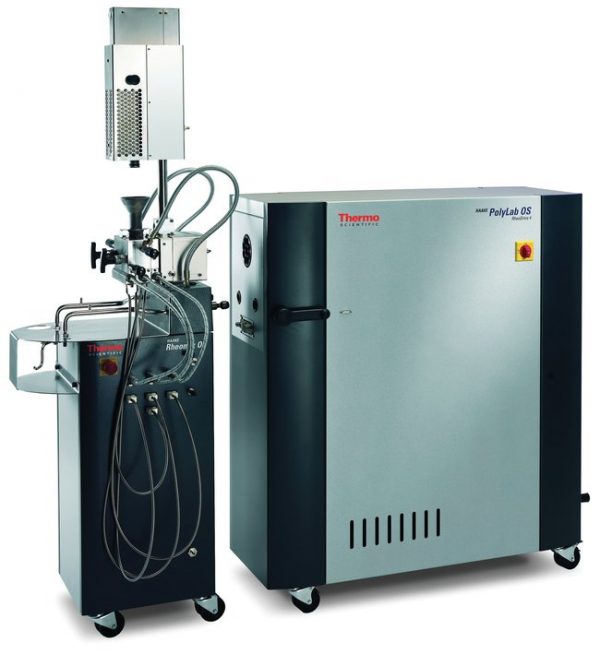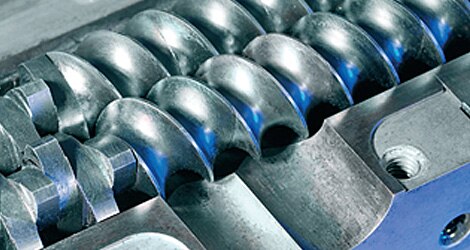HAAKE™ PolyLab OS Modular Torque Rheometer
The Thermo Scientific™ HAAKE PolyLab OS is a state-of-the-art measuring mixer and extruder system that is focused on the specific needs in research and development. The HAAKE PolyLab OS provides you with process-relevant material data including: Melting behavior, influence of additives, temperature stability, shear stability and melt viscosity. Furthermore, this measuring mixer and extruder system supports you in process modelling activities such as: Compounding polymers with additives to reduce flammability, viscosity, etc., scale-up extrusion processes by using different L/D ratios to extrapolate to your master process line, simulating master processes using only as little as 50g of material to optimize extrusion or mixing in respect to temperature and shear profile or extrusion of strands, profiles or films in combination with rheological or optical measurements.
https://www.thermofisher.com/order/catalog/product/567-0021#/567-0021

HAAKE Rheomex CTW 100 OS Twin-Screw Extruder for the HAAKE PolyLab OS System
The HAAKE™ Rheomex CTW 100 OS Twin-Screw Extruder can be used for a wide range of tasks in laboratories and pilot plants when used together with specially designed screws with differing geometries.
· Continuous compounding with twin-screw extruders
· Twin-screw laboratory extruders have a proven record in continuous compounding with feed-dosing of different additives (liquid or solid) along the extruder barrel
· Combination of a twin-screw extruder unit with additional sensors offers the ability to measure material properties of the melt during processing
· Twin screw extruder with intermeshing counter-rotating screws provides a positive material displacement from the hopper to the die and thus high levels of pressure
· Conical design of twin screw compounder HAAKE Rheomex CTW 100 realizes very short dwell times and avoids dead volumes
· Applications such as processing of thermal critical compounds, development of new PVC compounds, mixing in processing additives, blending of polymers with different viscosity are usually supported with this extruder
Typical twin-screw investigations:
· Compounding of polymers with additives, reinforcing fibres and fillers
· Viscosity and flow behavior of the compound
· Extrudability and scale-up data
· Reactive extrusion
· Morphology of polymer and nano-composites
· Decomposition of biopolymers
Compatible with:
Peripheral devices such as feeding systems, application-specific screws, mixer rotors or extruder downstream equipment combine different modules to a complete downsized production line for the testing or small-scale production of new materials:
· Extrudate cooling baths
· Take-off units
· Blown film tower
· Inspection systems
· Feeders
· Pelletizers
· Melt pumps
· Capillary rheometers
HAAKE Rheomex OS Single Screw Extruder for the HAAKE PolyLab OS system
Thermo Scientific™ HAAKE Rheomex lab single screw extruders for the HAAKE PolyLab OS torque rheometer platform are focused on the analysis of rheological and processing characteristics of various materials. With only a small sample, amount customers can simulate production processes and generate films or profiles for further testing.
Single-screw extrusion
Proven single-screw laboratory extruders deliver reliable data captured during the extrusion process to verify process parameters (speed, energy, temperature) for unknown materials or to manufacture smaller quantities of a new polymer (as strands, sheets, pellets, blown films) during research and development. The extruders are equipped with measuring ports for melt pressure and melt temperature to study the process parameters along the extruder barrels. These barrels are available in different lengths (length/diameter ratio). A die can be connected to the end of the extruder barrel to form the polymer melt as strand or film. Special rheological dies (slit, rod, x-die) allow the determination of shear- and elongational viscosity at defined shear rates. A variety of screw geometries to customize the extrusion process with different compression ratios, venting and mixing sections is offered. Wear-reduced screws and barrels increase the lifetime of the system. Standard feeders for pellets and special feeding systems for powders, pastes, liquids or highly viscous rubber complete the set up.
Typical single-screw investigations
· Extrudability of newly developed materials
· Manufacturing homogeneous melts
· Manufacturing films, foils, strands and profiles for optical and mechanical testing as well as outdoor exposure tests
· Measuring rheological behavior (viscosity, elasticity)
· Testing individual and combined influences of additives (stabilizer, lubricant) and functional additives (anti-oxidation, UV-stabilizers, pigments and fillers)
· Foam extrusion
The HAAKE Rheomex measuring extruder contains the necessary measuring, control and monitoring technology for the respective application.
A new concept simplifies handling in the laboratory and enables secure operation. This is characterized by:
· mobile measuring sensors avoid the necessity of handling of heavy and hot parts
· integrated heating and cooling circuits reduce the number of plug connections and thus the danger of making incorrect connections
· several peripheral units such as feeding and post-extrusion units are computer controllable thus meaning better reproducibility and documentation
HAAKE Rheomix OS Lab Mixers for the HAAKE PolyLab OS system
HAAKE™ Rheomix Lab Mixers for the HAAKE™ PolyLab™ OS System torque rheometer platform are focused on batch testing of many highly viscous substances. Intelligent modular torque rheometer system for the simulation of industrial processes in the lab or pilot plants.
In a small-scale customers can characterize materials like polymers, elastomers, additives and fillers to avoid problems in their production.
Mixing, kneading, compounding and plasticizing
A typical mixer test is run at a defined speed (shear rate) versus time, and the material's response is recorded as torque. The mixing chamber is temperature-controlled precisely by independent heating and cooling zones, but due to the frictional heat in the mixing bowl, a change in the material's melt temperature is observed and recorded as measuring signal. This “Rheogram” (torque, melt temperature vs. time at constant speed) is characteristic for different materials or blends and often used as a “fingerprint” in Quality Control for incoming or outgoing product inspection. Different additives in type and concentration can be measured and quantified objectively through the melting behavior, consumed energy or melt viscosity (recorded torque).
Typical investigations
· Testing the melting and degradation behavior of polymer melts
· Quantifying viscosity when adding nano-particles or other additives
· Testing the gelation- and plasticizing behavior of PVC dry-blends
· Measuring the flow- and curing behavior of thermosetting plastics
· Characterizing the influences of different additives such as carbon black, fillers, lubricants, accelerators or sulphur for rubber mixtures
· Recording the masticating and vulcanizing behavior of elastomers
· Measuring the oil absorption of carbon black
· Quantifying the absorption of DOP for PVC dry-blends
· Measuring the stable torque in regard to individual and combined influences of fillers and additives such as stabilizers, lubricants and color pigments
· Testing high performance plastics to check processability
· Performing electric conductivity measurements for rubber mixtures
HAAKE Rheomix QC Lab Mixers for the HAAKE PolyLab QC System
HAAKE™ Rheomix QC Lab Mixers for the HAAKE™ PolyLab QC System torque rheometer platform are focused on batch testing of many highly viscous substances.
In a small-scale customers can characterize materials like polymers, elastomers, additives and fillers to avoid problems in their production.
Mixing, kneading, compounding and plasticizing
A typical mixer test is run at a defined speed (shear rate) versus time, and the material's response is recorded as torque. The mixing chamber is temperature-controlled precisely by independent heating and cooling zones, but due to the frictional heat in the mixing bowl, a change in the material's melt temperature is observed and recorded as measuring signal. This “Rheogram” (torque, melt temperature vs. time at constant speed) is characteristic for different materials or blends and often used as a “fingerprint” in Quality Control for incoming or outgoing product inspection. Different additives in type and concentration can be measured and quantified objectively through the melting behavior, consumed energy or melt viscosity (recorded torque).
Typical investigations
· Testing the melting and degradation behavior of polymer melts
· Quantifying viscosity when adding nano-particles or other additives
· Testing the gelation- and plasticizing behavior of PVC dry-blends
· Measuring the flow- and curing behavior of thermosetting plastics
· Characterizing the influences of different additives such as carbon black, fillers, lubricants, accelerators or sulphur for rubber mixtures
· Recording the masticating and vulcanizing behavior of elastomers
· Measuring the oil absorption of carbon black
· Quantifying the absorption of DOP for PVC dry-blends
· Measuring the stable torque in regard to individual and combined influences of fillers and additives such as stabilizers, lubricants and color pigments
· Testing high performance plastics to check processability
· Performing electric conductivity measurements for rubber mixtures



